Launch of the T&T National Committee on Reparations (TTNCR)
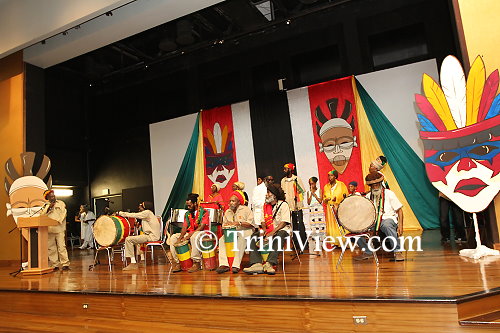
A Nyabinghi style drumming and invocation by the Trinidad and Tobago All Mansion Rastafarians
The Reparations Committee of Trinidad and Tobago held the formal launch of the agenda on Saturday June 13th, 2015, at the Daaga Auditorium at UWI, St. Augustine. Present for this launch included Minister of the National Diversity and Social Integration Rodger Samuel, Minister of Foreign Affairs Winston Dookeran, Vice-Chancellor of UWI and Chairman of the CARICOM Reparations Commission Professor Sir Hilary Beckles, Trinidad & Tobago Ambassador to CARICOM Sir Edwin Carrington, as well as First Peoples representatives, Rastafarians, members of the Orisha community, and civil society. The event opened with invocations by First Peoples Shaman Cristo Adonis, followed by Orisha priest Erin Folami. These invocations were followed by a Nyabinghi-styled drumming and invocation by the Trinidad and Tobago All Mansion Rastafarians.
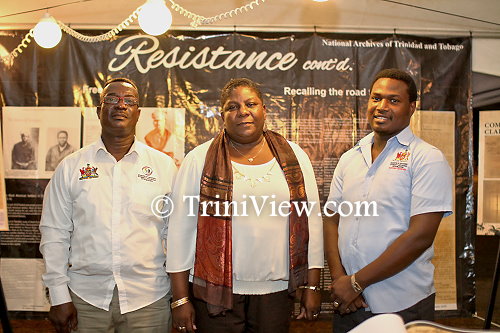
Representatives from the Ministry of National Diversity and Social Integration
Aiyegoro Ome, Chairman of the T&T National Committee on Reparations welcomed those gathered and reminded them of the long history of resistance to colonialism in Trinidad. He recalled the Arena Uprising by the First Peoples, the 1881 Hosay Riots, the 1884 Canboulay Riots, the Water Riots of 1905 in which the Red House was burned down and the 1930’s Butler Riots. He went on to introduce the members of the Trinidad and Tobago Reparations Committee to the audience. The committee includes:
Trinidad and Tobago Ambassador to CARICOM Sir Edwin Carrington
Avril Belfon of the National Archives of Trinidad and Tobago Curriculum Development Division of the Ministry of Education Theresa Neblett-Skinner
Ms. Lucia Phillip of NALIS
Attorney Dr. Sharon Legall
Mr. Anthony Birchwood of the Department of Economics, UWI, St. Augustine
Chief Executive Officer of the Government Information Services Limited Mr. Andy Johnson
Chairman of Emancipation Support Committee Mr. Khafra Kambon, Chief Ricardo Bharath Hernandez of the Santa Rosa First People’s Community
Der One Piankhi of the Council of Orisha Elders of Trinidad and Tobago
Mr. Clyde Noel of the All Mansions of Rastafari, Trinidad and Tobago.
The committee also has representatives from the Office of the Prime Minister, the Ministry of the Attorney General, the Ministry of Arts and Multiculturalism and the University of Trinidad and Tobago.
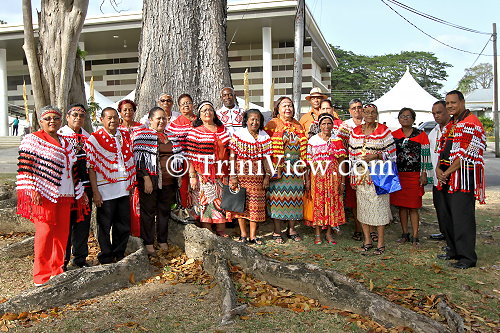
Members of the Santa Rosa First Peoples Community
The Chief of the Santa Rosa First Peoples in Trinidad Mr. Ricardo Barath Hernandez addressed the audience explaining the involvement and significance of the First Peoples to the reparations process. He reminded the audience that Indigenous Peoples have historically been marginalised from the time of European conquest under the Doctrine of Discovery which stated that ”Any land that was not inhabited by Christians was available to be ‘discovered’, claimed and exploited.”
“The Governments of Europe committed genocide upon the native Caribbean population. A community of three million has been reduced to less than thirty thousand,” Barath said, further noting that “Survivors remain traumatized, landless and are the most marginalized social group within the region. Through encomiendas, missions and exile the native Caribbean population were enslaved, and their lands appropriated by the colonizers.”
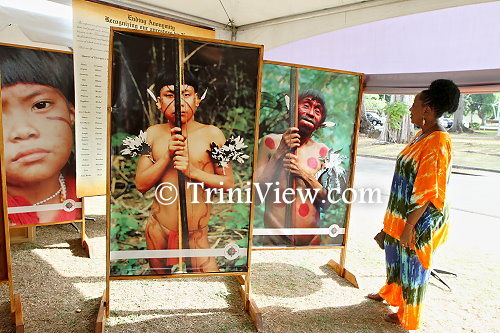
Historical photographic display
As such, he put forward that it is important for the region to recognize that the First Peoples’ experience, including in those CARICOM countries where communities no longer exist, goes hand in hand with African enslavement, and strengthens the case for reparatory justice.
Barath also pointed out that reparations involved not just European nations but also governments of the region: “First Peoples are historically dispossessed. It is therefore incumbent on governments to begin the Reparation themselves. Governments who inherited the governance of the former colonies, while they did not commit the atrocities, have a responsibility to recognize the First Peoples by doing meaningful acts of Reparation.”
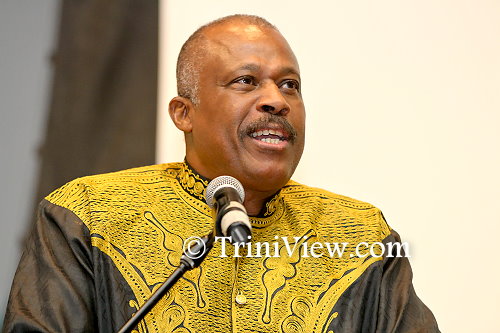
Professor Sir Hilary Beckles
Feature speaker of the evening Professor Sir Hilary Beckles, Vice-Chancellor of The UWI and Chairman of the CARICOM Reparations Commission outlined the Reparations Commission’s vision of reparation in seeking to address historical wrongs and contribute to the development of the Caribbean region. Part of this vision includes a ten point agenda by which the movement for reparatory justice can be developed to address the Native Genocide against indigenous inhabitants, slavery and the slave trade against Africans, as well as the colonisation of countries in the region.
Although saying that Caribbean people are ahead of their government where reparations are concerned, Beckles acknowledged that most people in the region have no interest in reparations. He attributed this to those who do not wish to pay reparations who discredit the reparations movement by constructing it as a project by those who want to wallow in history, inferiority and dependency.
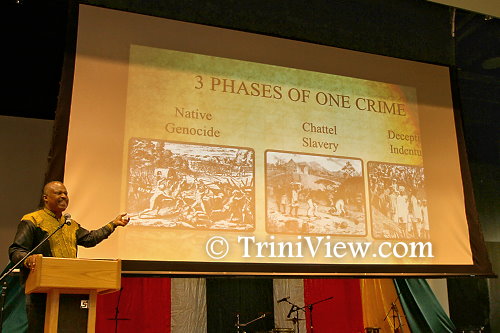
Professor Sir Hilary Beckles, Vice-Chancellor of The UWI and Chairman of the CARICOM Reparations Commission
He challenged notions that reparatory justice is about hand outs and dependency:
“I have sought to reject the notion that reparations is about cash handouts, and human mendicancy. Rather, that it is about public health, education, poverty eradication, institutional and cultural racism, debt relief, and support for the repatriation of those Africans who wish to return to Africa, and support for development programmes for First Nation peoples. The cost of these development programmes should be supported by European nations within the context of a reformed development paradigm.”
Professor Beckles further challenged the perception that the move for reparation justice calls for a politic of confrontation: “There is no historical evidence to suggest that reparatory justice is about confrontation. It has always been about reconciliation, the search for truth and the search for healing.”
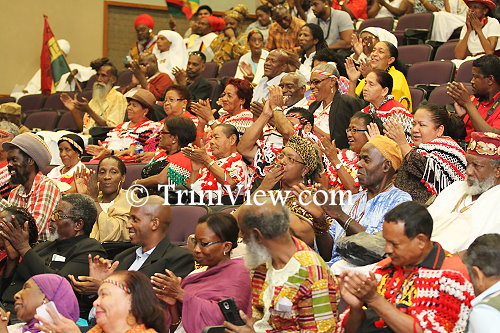
Members of the audience
Drawing upon historical narratives, Professor Beckles showed how members of the ruling elite in England are directly tied to the wealth generated by slave plantations. Beckles recalled that the British House of Lords had concluded that this was the largest crime committed in the modern world and we do not even know how to comprehend a settlement … that the crime is too large to litigate. He linked the many social problems in the region to the colonial mess inherited by Caribbean governments at Independence: “This mess cleaning has led to heavy expenditure in social policy, creating huge fiscal deficits in most instances. Colonial powers should be sharing the burden and partnering in our heroic efforts to create sustainable nations out of the rubble of colonialism,” he stated.
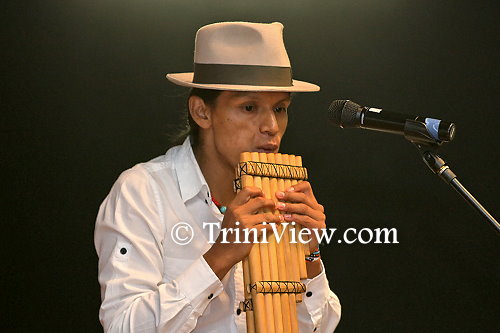
Member of the Yuyaric Kayna from Ecuador
Performances on the night included Carlyle Oliver on the steelpan, young Jerimiah James with the calypso “Reparation”, veteran calypsonian Chalkdust who delivered two compositions titled “Grandfather Backpay” and “Reparations” and the group Yuyaric Kayna from Ecuador treated the audience to the music of the first peoples.
Launch of the Trinidad and Tobago National Commission on Reparations (TTNCR) in pictures:
www.triniview.com/gallery/main.php?g2_itemId=826338